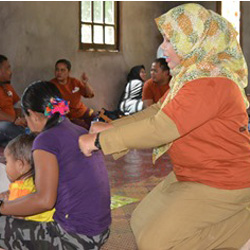Getting a healthy start in Indonesia
March 16, 2016
Changing the way families think about food and nutrition may sound like a tall order, but at Cargill’s oil palm plantations in Indonesia, that is the ambitious goal on National Nutrition Day and throughout the year.
A 2013 study by the Indonesian health department revealed that chronic malnourishment (commonly referred to as “stunting”) remains prevalent among young Indonesian children. Provinces such as West Kalimantan and South Sumatra, where Cargill’s oil palm plantations operate, register a high rate of chronic malnourishment. In fact, West Kalimantan and South Sumatra rank sixth and 24th respectively out of the 34 provinces with a high number of malnourished children.
 A representative from the health department in Ketapang teaches a special massage technique to stimulate the production of breast milk.
Held annually on Feb. 28 in Indonesia, National Nutrition today convenes communities, colleagues and local governments to commit to developing healthier, stronger citizens and to support sustainable economic development and the alleviation of poverty.
A representative from the health department in Ketapang teaches a special massage technique to stimulate the production of breast milk.
Held annually on Feb. 28 in Indonesia, National Nutrition today convenes communities, colleagues and local governments to commit to developing healthier, stronger citizens and to support sustainable economic development and the alleviation of poverty.
This year on National Nutrition Day, Cargill employees and their families joined local governments and communities for a series of workshops on breastfeeding, infant nutrition and healthy living.
Starting young
At a workshop for more than 200 women from PT Harapan Sawit Lestari and its neighboring communities, participants learned the benefits of breastfeeding and the importance of introducing a healthy diet to their children.
Rani Maasong, the wife of a Kepala Adat (tribal elder) at Air Tarap village in Kendawangan sub-district, was guided on the common misconception of formula feeding over breastfeeding.
“I feed my baby with formula milk because I’ve always thought it is more nutritious,” she said. “However, breast milk contains the right balance of nutrients and boosts a baby’s immune system. We are strongly encouraged to breastfeed our babies in the first six months after birth.”
Siti Dewi, the wife of a Cargill employee and member of Jungle Queen, a women’s welfare group within Cargill, shared some of the company’s maternity benefits, such as time off to breastfeed during work hours and the option to choose to work near a crèche.
“As mothers, we each have a responsibility to lay the foundation for our kids to grow into healthy, strong and active adults,” said Siti.
Starting the day right
Raising a healthy child begins with the first meal of the day. Children who consume breakfast regularly are commonly said to receive a variety of benefits, including having more energy and doing better in school.
On National Nutrition Day, a breakfast of toast and milk was distributed to more than 1,100 elementary school students at Cargill’s PT Hindoli plantation.
Dr. Meryah, PT Hindoli’s company doctor, explained the benefits of starting the day with a healthy meal. “Children expend a lot of energy during their growing years as they have a high metabolic rate. They need to consume the right type of food during these years. A slice of bread and a glass of milk for breakfast provides the necessary carbohydrates, vitamins B and D, iron, fiber and calcium for their growth.”
Unfortunately, however, not many families in rural Indonesia can afford a healthy meal. According to studies by the Food and Agriculture Association of the United Nations, low-income households in rural communities are less likely than high-income households to feed their children nutritious foods such as eggs, green leafy vegetables and meat.
At Cargill’s Poliplant Group plantation in West Kalimantan, employees and their families served a wholesome breakfast of mungbean porridge, cereal and milk to close to 600 public elementary school students. Many of these children came from low-income families where nutrition is not a daily priority.
“With Cargill’s support, we are able to change their attitudes toward food and reinforce the long-term benefits of a healthy lifestyle from [a young age],” said Kusmono, head of the nearby Kedondong village. “We want our children to mature into healthy, productive adults. We want them to pursue their dreams and contribute actively to the future of our country.”
